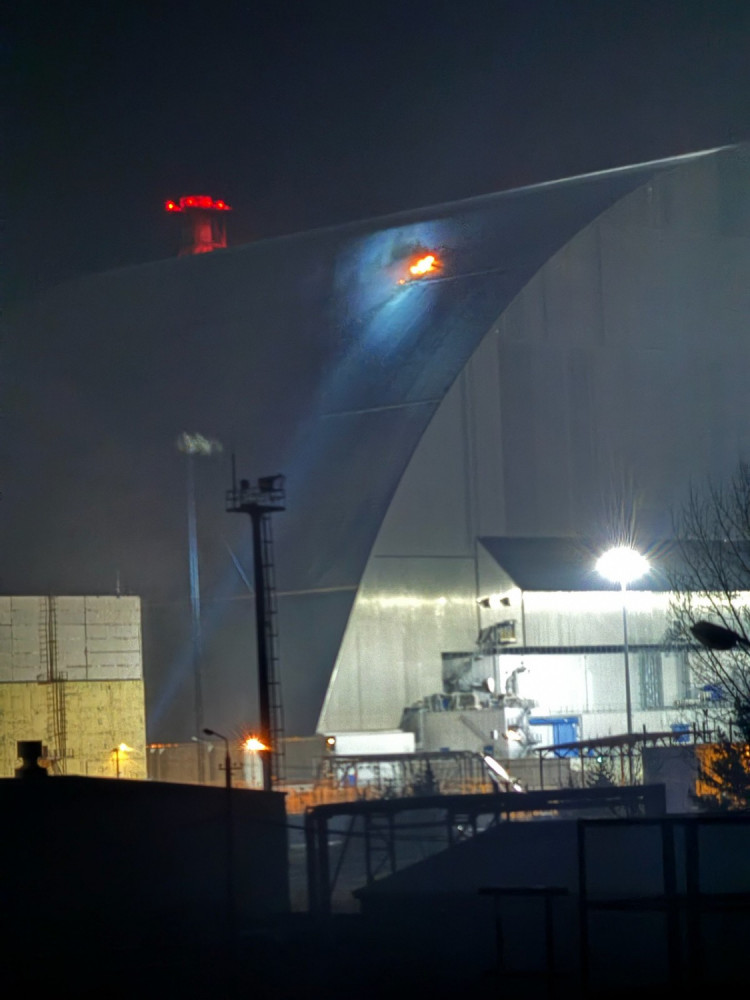A Russian drone carrying a high-explosive warhead struck the containment shell of the Chernobyl nuclear power plant overnight, Ukrainian President Volodymyr Zelensky said Friday. The attack, which came hours before the start of the Munich Security Conference, caused "significant" damage to the sarcophagus encasing the plant's destroyed Unit 4 reactor and sparked a fire that was later extinguished.
Despite the impact, Ukraine's State Emergency Service said radiation levels remain within normal limits, a statement echoed by the International Atomic Energy Agency (IAEA). The UN nuclear watchdog reported that its team at the site heard a large explosion shortly before 2 a.m. local time. "The Chernobyl strike and increased military activity near Zaporizhzhia underline persistent nuclear safety risks," IAEA Director General Rafael Grossi said.
Kremlin spokesperson Dmitry Peskov denied Moscow's involvement, calling the strike "yet another provocation." "The Russian military doesn't do that," Peskov told reporters. "This is exactly the kind of thing the Kyiv regime is known for and sometimes does not hesitate to do."
Zelensky, however, blamed Russia for the attack and warned of the broader global risk posed by Moscow's military actions near nuclear facilities. "The only state in the world that can attack such facilities, occupy the territory of nuclear power plants, and conduct hostilities without any regard for the consequences is today's Russia," he said in a post on Telegram. "Russia must be held accountable for what it is doing."
The Chernobyl sarcophagus, a massive steel and concrete structure designed to contain radioactive materials, was completed in 2017 after decades of international efforts. Andriy Yermak, Zelensky's chief of staff, noted that the U.S. "invested a lot of money and effort" into its construction and said Ukraine would provide detailed information about the attack to American officials.
The incident comes amid shifting diplomatic dynamics between the U.S. and Russia. Two days before the strike, former President Donald Trump held what he described as a "lengthy and highly productive" phone call with Russian President Vladimir Putin. The conversation has fueled speculation about potential peace talks, which Trump has indicated he is willing to broker.
Further complicating the geopolitical landscape, U.S. Defense Secretary Pete Hegseth told European leaders in Brussels on Wednesday that Ukraine's NATO membership-a key goal for Kyiv-was not a realistic outcome of a negotiated settlement. His remarks suggested a potential shift in U.S. priorities in the region. However, Vice President JD Vance signaled a tougher stance in an interview with The Wall Street Journal, stating that sending U.S. troops to Ukraine remained "on the table" and warning of economic consequences if a peace deal did not secure Kyiv's long-term independence.
Ukraine's military reported that Russia launched 133 drones across the country in the overnight assault, with 73 being shot down. The attack aligns with Moscow's ongoing strategy of targeting Ukrainian infrastructure and energy facilities as the war nears its third year.
The strike on Chernobyl also raised fresh concerns about the Zaporizhzhia Nuclear Power Plant, Europe's largest, which has been under Russian occupation since early 2022. During fighting near Zaporizhzhia that year, Grossi warned that "every principle of nuclear safety" had been violated, highlighting the risk of a catastrophic accident.
Zelensky, speaking ahead of his meeting with Vance in Munich, pointed to the ongoing drone strikes as evidence that Putin "is definitely not preparing for negotiations-he is preparing to continue deceiving the world." The Ukrainian leader has long argued that Moscow's diplomatic overtures serve as stalling tactics while Russian forces continue military operations.






